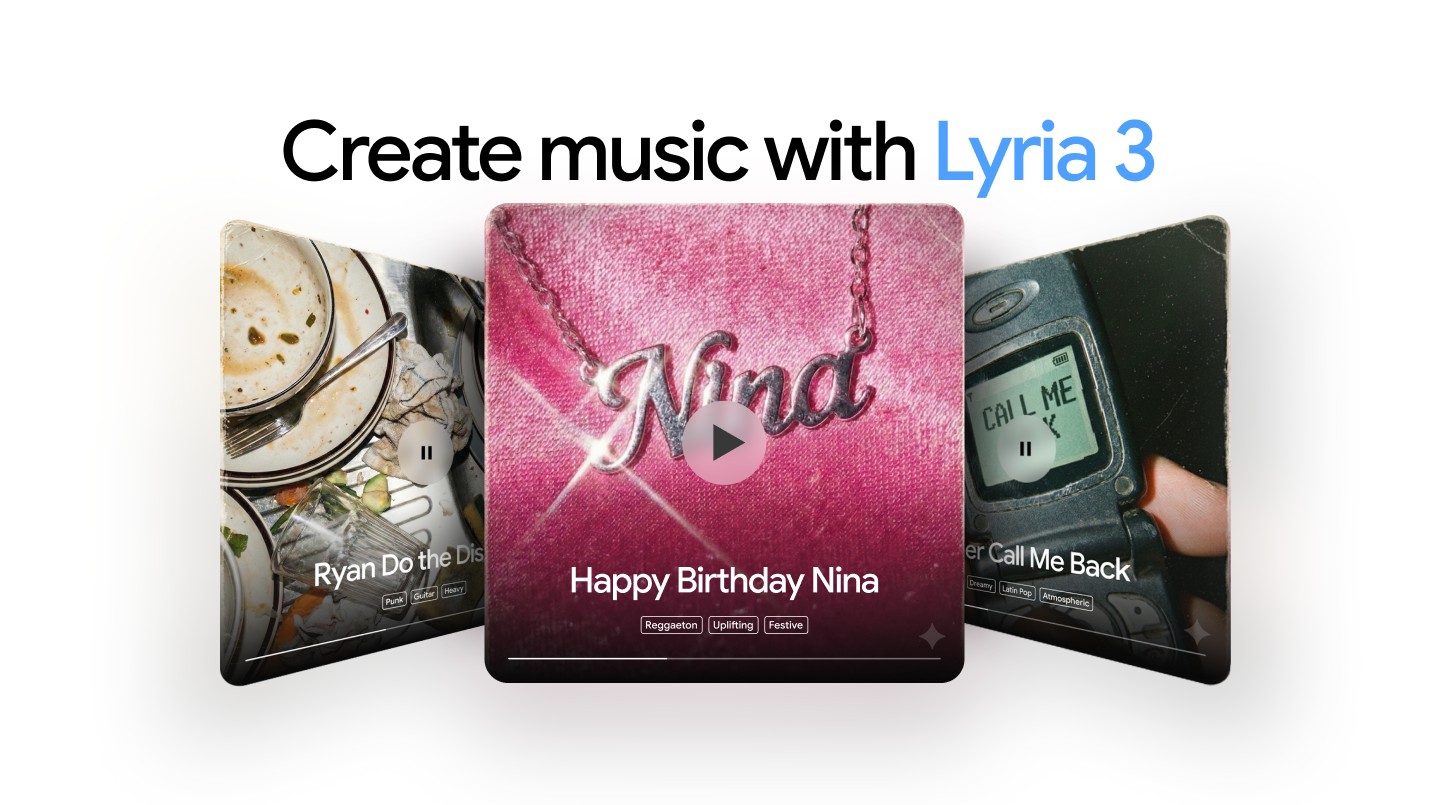Google Pixel 8 vs. Google Pixel 8 Pro: Should you go Pro?
The latest Pixel 8 lineup has so much going for it, that it's hard to decide which phone is right for you.
Get the latest news from Android Central, your trusted companion in the world of Android
You are now subscribed
Your newsletter sign-up was successful
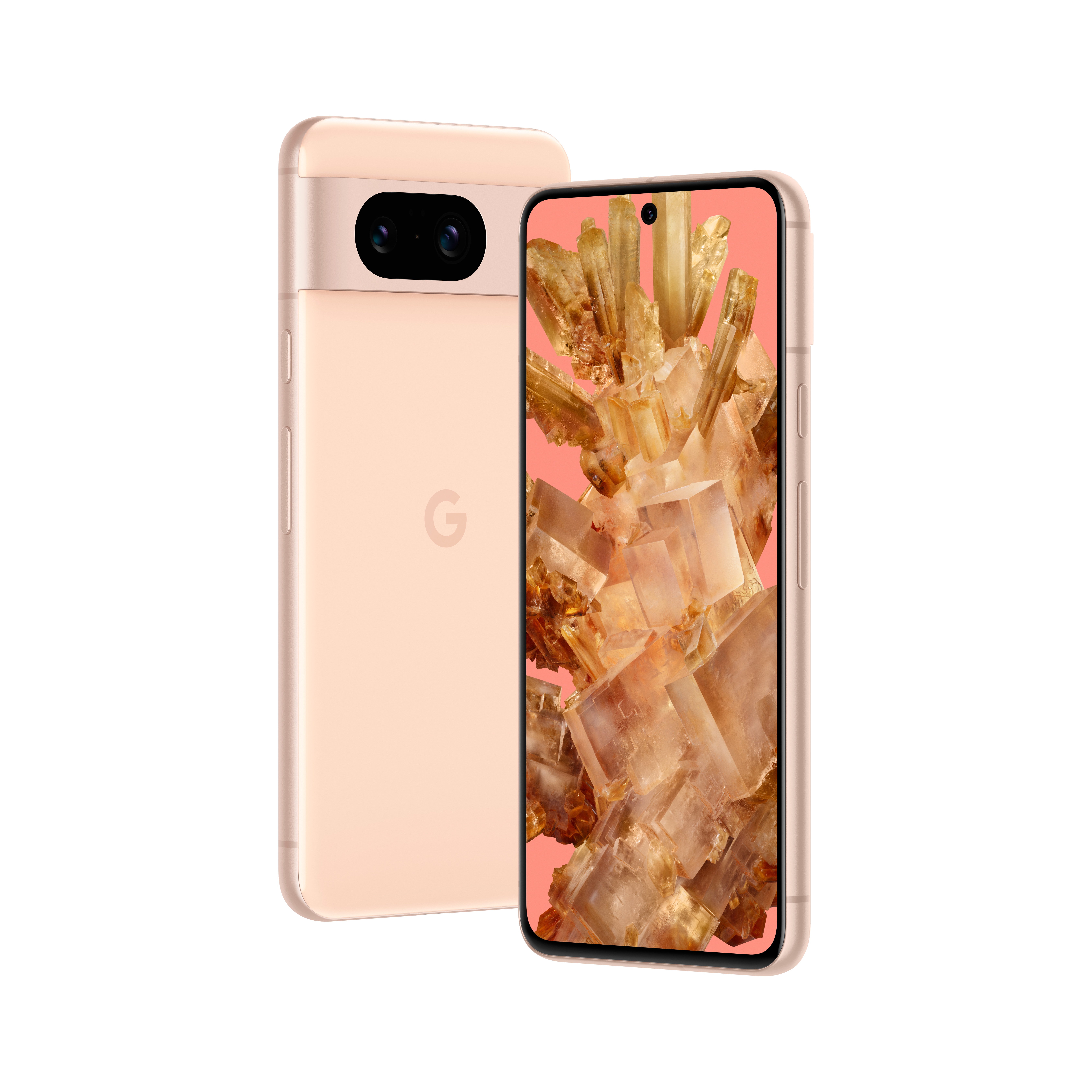
The value flagship
Google may have hiked the Pixel 8's price, but that doesn't take away from the phone's greatness. Equipped with intuitive and super useful AI-powered features, the Tensor G3-run device delivers an experience like no other and captures fantastic photos and videos. The battery life isn't as good as the Pixel 8 Pro, and there's no telephoto lens or temperature sensor, but you do get a smaller 120Hz display that makes the phone easier to wield. To make things even better, Google now promises seven years of OS updates.
Pros
- Android 14 with 7 years of updates
- Incredible cameras for photography and videography
- Tensor G3 chipset
- Super Res Zoom up to 8x
- 6.2-inch 120Hz OLED peaks at 2000 nits, suitable for one-handed use
- Smaller and lighter than Pixel 7
Cons
- No temperature sensor
- Lower battery and charging specs
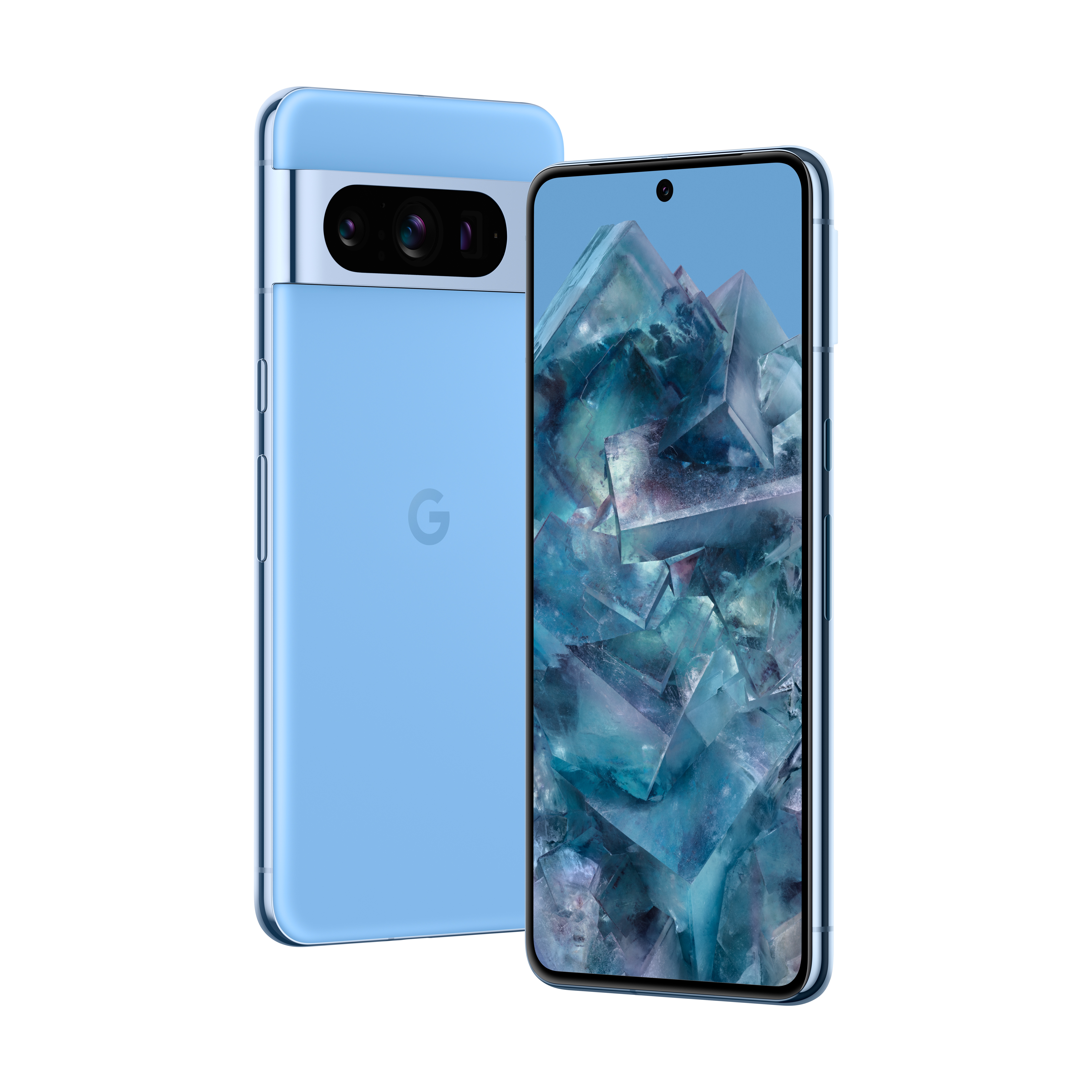
The ultimate Pixel
The tall and mighty Pixel 8 Pro is extremely powerful and packed to the brim with delicious features. Everything from the state-of-the-art cameras to the bright and crisp display screams premium. You get a larger battery and faster charging compared to the Pixel 8, and there's a new temperature sensor onboard. The Pixel 8 Pro also comes with a 48MP telephoto lens as well as 5x optical zoom and up to 30x Super Res Zoom. It isn't designed for one-handed use, though, and weighs more as well.
Pros
- Android 14 with 7 years of updates
- Incredible cameras for photography and videography
- 48MP telephoto lens
- Temperature sensor
- Better battery and charging specs
- Tensor G3 chipset
- 6.7-inch 120Hz OLED peaks at 2400 nits
- 5x optical zoom and Super Res Zoom up to 30x
Cons
- More expensive
- Not suitable for one-handed use
The ultimate smartphone showdown of the year is finally here. The battle of Google Pixel 8 vs. Google Pixel 8 Pro is gruelling. Both phones pack so many features, both on the hardware and software side of things. Google has upped the ante, bringing its Pixel lineup to another level.
So, how do you decide whether you should stick with the Pixel 8 or opt for the upgraded Pixel 8 Pro? For starters, a simple spec sheet comparison helps a lot. Next, we'll break down just what's different between the two and whether the Pro version justifies the cost. Since both devices cost $100 more than their predecessors, this is going to be a tough call to make.
Google Pixel 8 vs. Google Pixel 8 Pro: Breaking down the specs
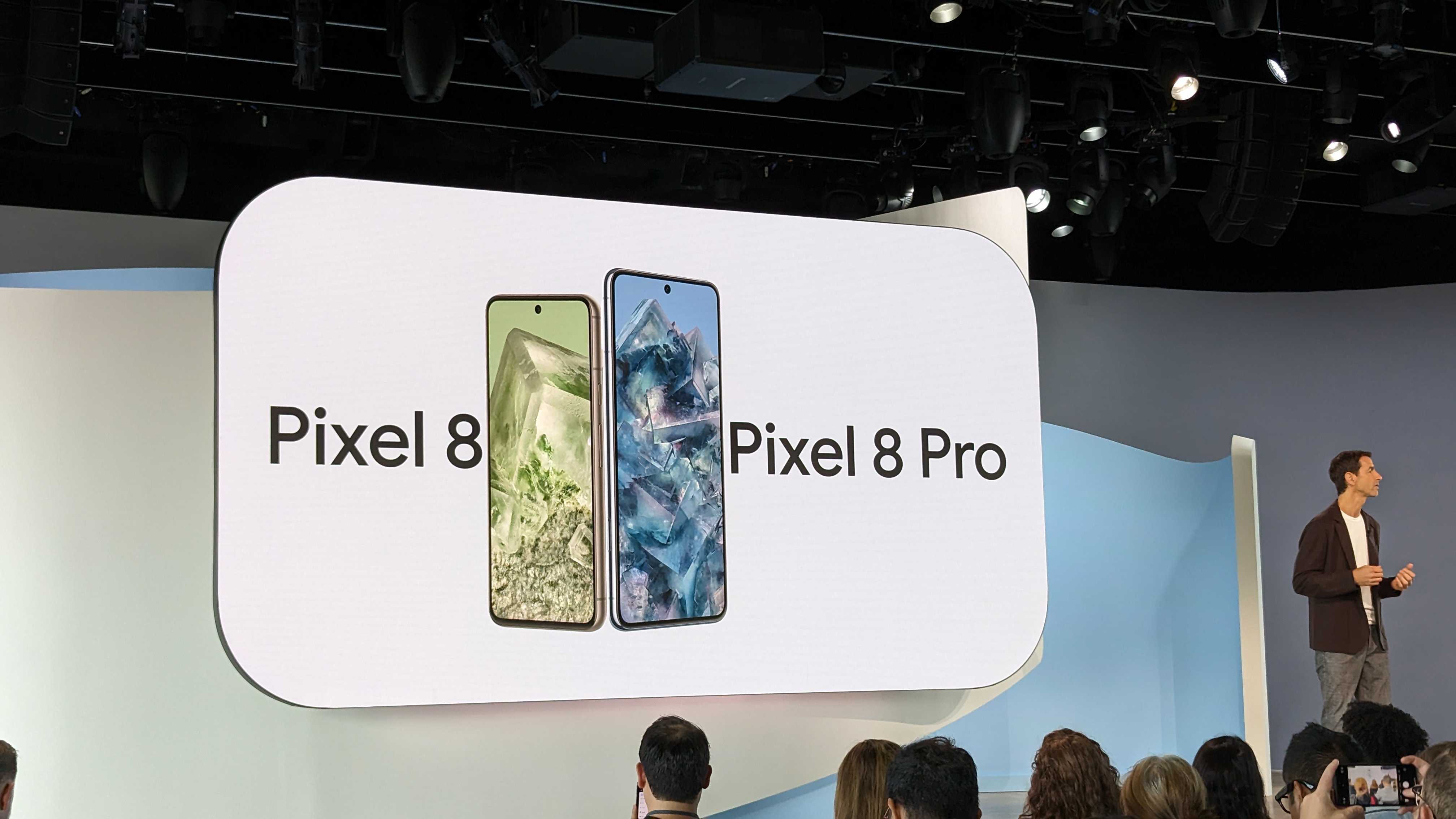
Google upgraded every single camera sensor on the Pixel 8 Pro, whereas the Pixel 8 retains last year's ultrawide sensor. Since both phones boast the Tensor G3 chipset, they are just as powerful and capable as each other. Naturally, Google limited some of its best features to the more expensive Pixel 8 Pro, such as a telephoto lens and temperature sensor.
The design language of both phones hasn't change much over the last iteration, with the bold camera island staying omnipresent. However, the edges of both Pixels are noticeably rounder and the screens are now flat instead of being curved.
We also have newer color variants for both phones, with Obsidian being a shared option across both models. Much like the Pixel Fold, you can also grab the Pixel 8 Pro in Bay and Porcelain. On the other hand, the Pixel 8 is available in Rose and Hazel.
| Category | Google Pixel 8 | Google Pixel 8 Pro |
|---|---|---|
| OS | Android 14, 7 years of updates | Android 14, 7 years of updates |
| Display | 6.2-inch 120Hz OLED (2400x1080), 2000 nits HDR10+, Gorilla Glass Victus | 6.7-inch 120Hz OLED (3144 x 2992), 2400 nits HDR10+, Gorilla Glass Victus 2 |
| Chipset | Google Tensor G3, Titan M2 | Google Tensor G3, Titan M2 |
| RAM | 8GB, LPDDR5 | 12GB, LPDDR5 |
| Storage | 128GB/256GB, UFS 3.1 | 128GB/256GB/512GB/1TB, UFS 3.1 |
| Rear camera 1 | 50MP Octa PD wide, 1.2 μm pixel width, ƒ/1.68 aperture, 82° FoV, 1/1.31" image sensor size, Super Res Zoom up to 8x, 2x Optical Quality | 50MP Octa PD wide,1.2 μm pixel width, ƒ/1.68 aperture, 82° FoV, 1/1.31" image sensor size, 2x Optical Quality |
| Rear camera 2 | 12MP ultrawide, autofocus, 1.25 μm pixel width, ƒ/2.2 aperture, 125.8° FoV lens correction | 48MP Quad PD ultrawide, autofocus, 0.8 μm pixel width, ƒ/1.95 aperture, 125.5° FoV lens correction |
| Rear camera 3 | ❌ | 48MP Quad PD telephoto, 0.7 μm pixel width, ƒ/2.8 aperture, 21.8° FoV, 5x optical zoom, Super Res Zoom up to 30x |
| Front camera | 10.5MP, dual PD, 1.22μm pixel width, ƒ/2.2 aperture, fixed focus 95° ultrawide FoV | 10.5MP, dual PD, 1.22μm pixel width, ƒ/2.2 aperture, autofocus 95° ultrawide FoV |
| Connectivity | USB-C 3.2, Wi-Fi 7, Sub-6 5G, Bluetooth 5.3, NFC | USB-C 3.2, Wi-Fi 7, Sub-6 5G, Bluetooth 5.3, NFC |
| Ingress Protection | IP68 dust and water resistance | IP68 dust and water resistance |
| Sensors | Proximity sensor, ambient light sensor, accelerometer, gyrometer, magnetometer, barometer | Temperature sensor, proximity sensor, ambient light sensor, accelerometer, gyrometer, magnetometer, barometer |
| Security | In-screen module | In-screen module |
| Audio | Stereo sound, USB-C | Stereo sound, USB-C |
| Battery | 4,575mAh, 30W wired charging, 18W wireless charging, 5W reverse wireless charging | 5,050mAh, 30W wired charging, 23W wireless charging, 5W reverse wireless charging |
| Dimensions | 150.5 x 70.8 x 8.9mm, 187g | 162.6 x 76.5 x 8.8mm, 213g |
| Colors | Hazel, Obsidian, Rose | Obsidian, Porcelain, Bay |
Amazingly, Google has promised seven years of security and major platform upgrades for the Pixel 8 and Pixel 8 Pro. This means that both Android 14 devices are going to be supported until 2030, including Pixel Feature Drops. This is a major improvement for both phones and unheard of in the Android phone space so far.
When comparing the Google Pixel 8 vs. Google Pixel 8 Pro, you'll notice a lot of common specs. Identical connectivity features include Bluetooth 5.3, Wi-Fi 7, NFC, Sub-6 5G, one physical SIM slot, eSIM support, and USB-C 3.2. You get the same UFS 3.1 storage options, with both phones available in 128GB, 256GB, and 512GB in most regions. Select areas also have the Pixel 8 Pro in a whopping 1TB version.
Get the latest news from Android Central, your trusted companion in the world of Android
Other shared genes include IP68 water and dustproofing, stereo speakers, an in-display fingerprint reader, the Titan M2 security chip, and a bunch of different sensors. You get LPDDR5 RAM in both Pixel 8 devices, but the Pixel 8 has 8GB, whereas the 8 Pro has 12GB of it.
Google Pixel 8 vs. Google Pixel 8 Pro: Key differences
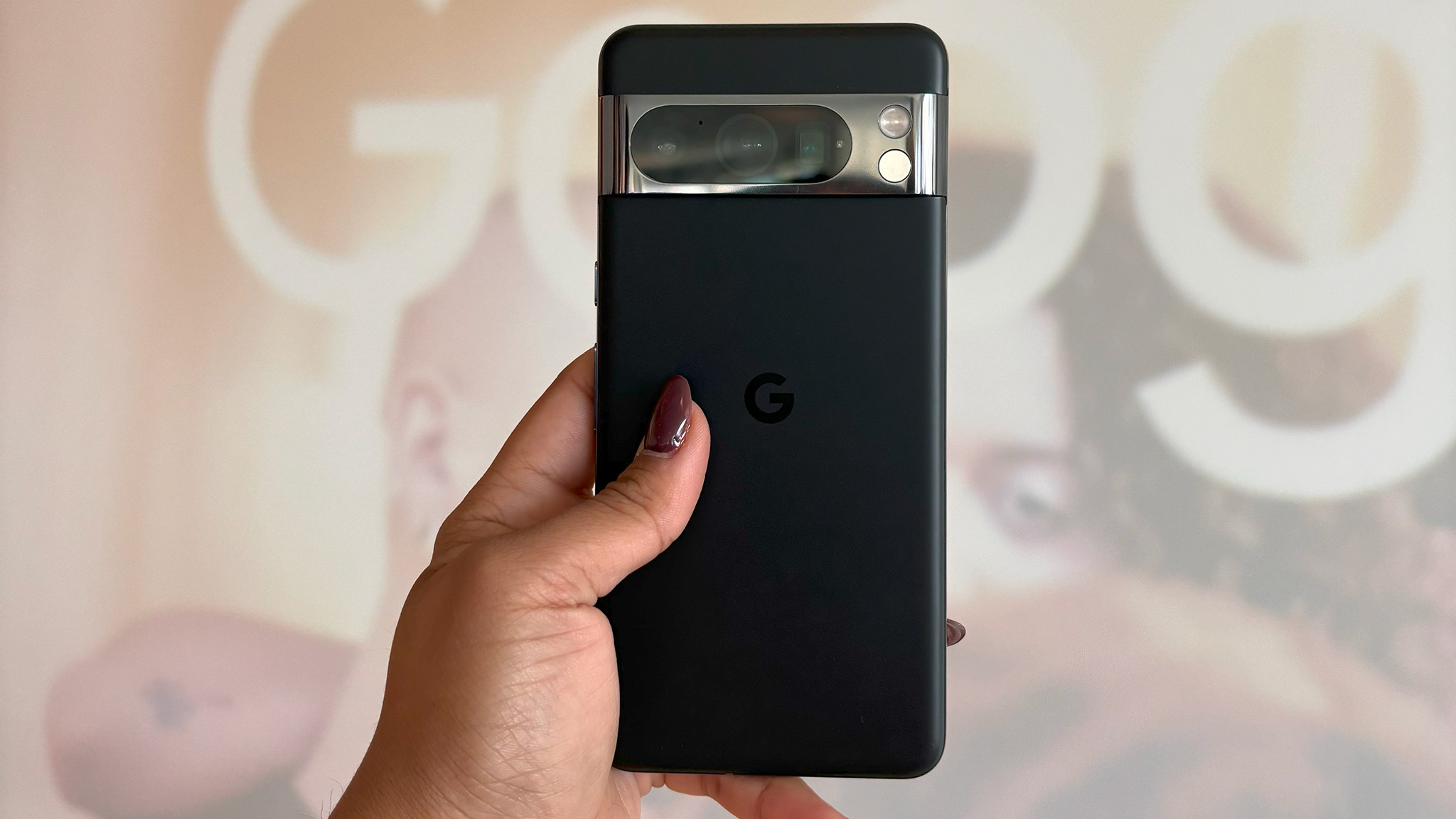
Google has done a marvelous job with the Pixel 8 and Pixel 8 Pro. These phones bring exciting new features that we can't wait to try out. These being Pixel devices, there's a heavy emphasis on the cameras. We'll dive into that in a bit, but let's talk about the other important factors that differentiate these Pixel flagships.
The first thing you're going to look at and the bit that you'll interact with the most is the display. Google shrank the Pixel 8's screen size compared to the last-gen Pixel 7, but not by a lot. It also has better brightness and a higher screen refresh rate. The 6.2-inch 120Hz OLED panel has a 2400x1080 resolution and a peak brightness level of 2000 nits. This is pretty bright and should be easily visible in sunlight. This is reinforced via a layer of Gorilla Glass Victus on top.
For the Pro model, Google bumped up the resolution and brightness even more. The Pixel 8 Pro sports a 6.7-inch 120Hz OLED display with a 3144 x 2992 QHD+ resolution. The Pro variant peaks at an even higher 2400 nits and has the more robust Gorilla Glass Victus 2 protecting the screen. In terms of visibility, quality, and durability, the Pixel 8 Pro wins this round.
In terms of visibility, quality, and durability, the Pixel 8 Pro has a much better display.
Then you have the battery capacity and charging speed, which is disappointing, to say the least. In a world where some phones can charge at over 200W via USB-C, the Pixel 8 and 8 Pro max out at a measly 30W with a PPS PD 3.0 Type-C charger. On the wireless charging front, the picture remains sad, with the Pixel 8 supporting 18W and the Pixel 8 Pro supporting 23W, but only on the Pixel Stand (2nd Gen). Standard Qi wireless chargers with the EPP profile can deliver up to 12W wireless charging speeds on both Pixels.
Both the Pixel 8 and 8 Pro have slightly larger battery capacities than the preceding models, but they also have brighter displays, which could offset the difference. Google promises a 24-hour battery life on both Pixels, but we can't be sure of this until we have tested this for ourselves. The Tensor G3's efficiency and power management capabilities play a crucial role here. Since the 8 Pro has a variable refresh rate between 1Hz and 120Hz and the Pixel 8 between 60Hz and 120Hz, this should reduce power consumption based on what you're doing on your phone.
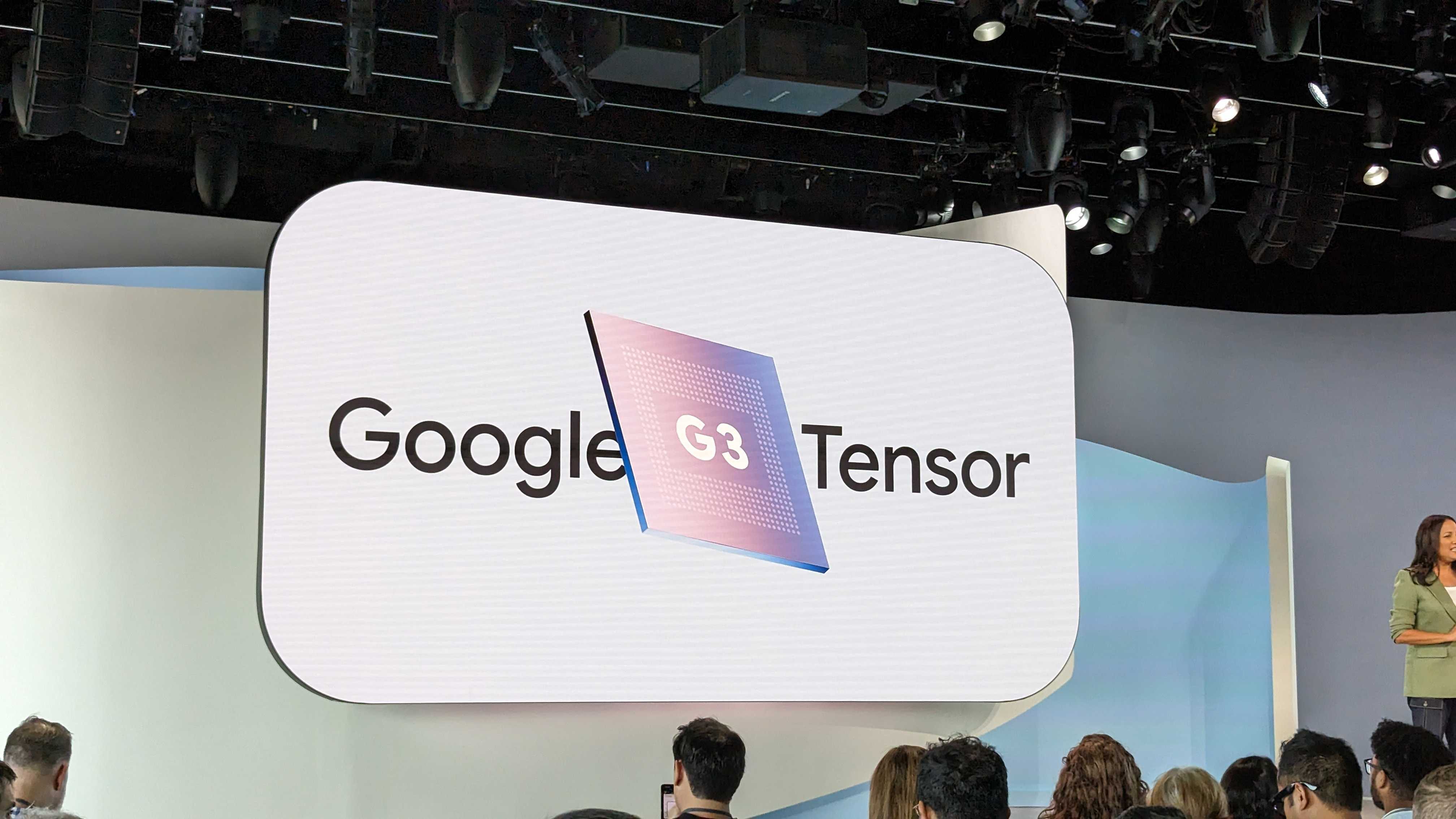
The Pixel 8 phones also make the most of Googe's AI research and the AI-centric Tensor G3 SoC, delivering extremely cool capabilities. Users get a barrage of cool features on both devices, including things like Audio Magic Eraser, Improved Clear Calling, advanced Call Screen, powerful on-device translations, live captions in multiple languages, cross-language text-to-speech conversion, Pixel Call Assist, and Bard on Google Assistant.
There's one last difference to be highlighted before heading into the camera comparison. Google added a temperature measurement sensor to the Google Pixel 8 Pro exclusively. Users can use it to measure the temperature of objects around them. While it isn't approved by the FDA yet, Google also hopes to incorporate this into the Fitbit app and enable users to track their body temperature as a health metric.
Google Pixel 8 vs. Google Pixel 8 Pro: Unbelievable cameras
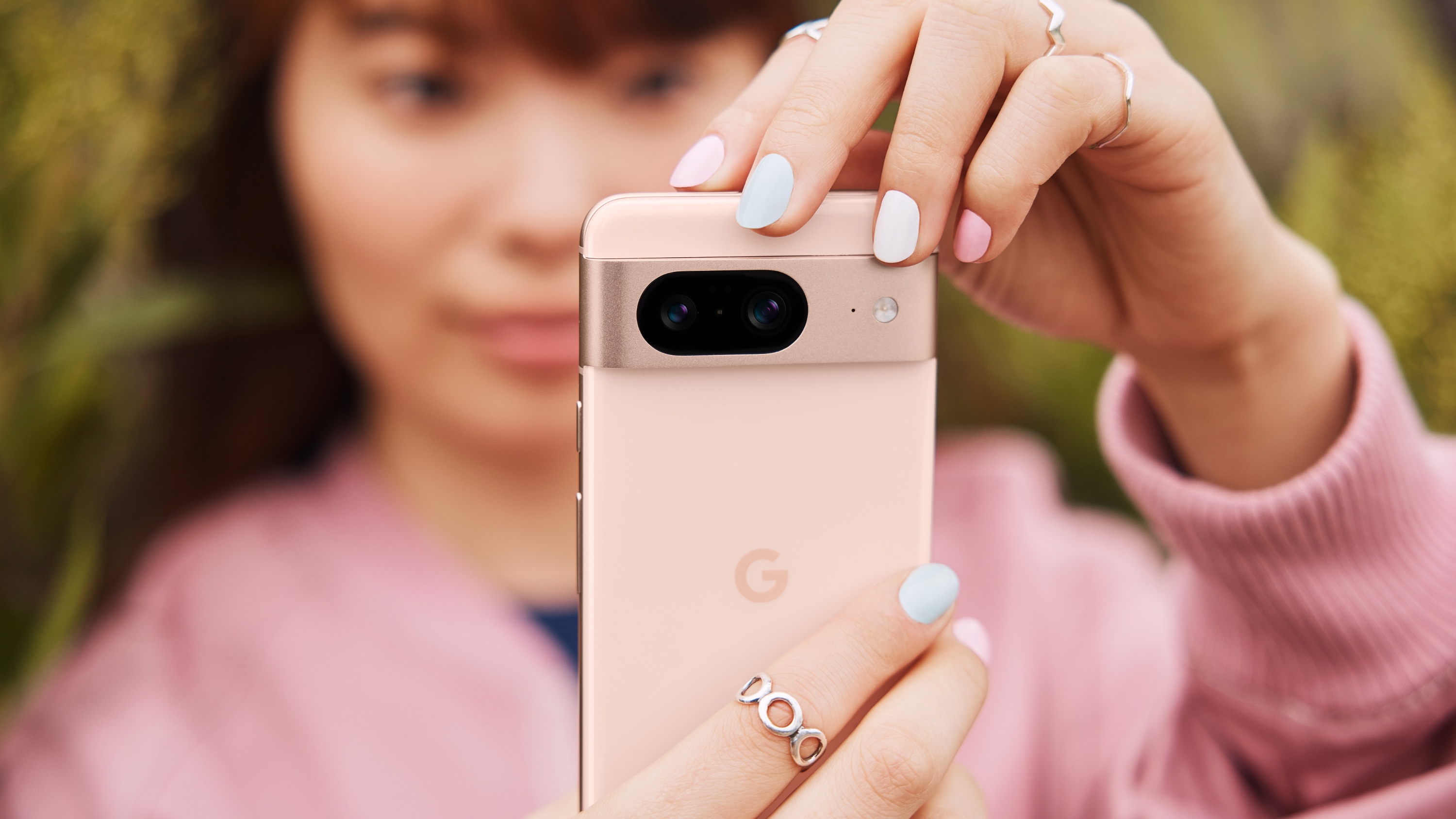
Pixel photography has achieved legendary status, and Google just proved why all over again. The Pixel 8 and Pixel 8 Pro both sport phenomenal cameras, but the 8 Pro has a clear edge over its more affordable sibling.
Google kept the Pixel 7's 12MP ultrawide lens on the Pixel 8, but the primary sensor is a brand-new 50MP Octa PD wide lens. It has a 1.2 μm pixel width, ƒ/1.68 aperture, 82° FoV, and 1/1.31" image sensor size.
All of the upper-tier Pixel 8 Pro's cameras are completely new, with the same 50MP primary sensor as the Pixel 8 and two more 48MP lenses. This includes a Quad PD ultrawide camera with autofocus, a 0.8 μm pixel width, ƒ/1.95 aperture, and 125.5° FoV lens correction. Excitingly, the third rear camera is a 48MP Quad PD telephoto lens with a 0.7 μm pixel width, ƒ/2.8 aperture, 21.8° FoV, 5x optical zoom, and Super Res Zoom up to 30x.
Both Pixel 8 devices have outstanding camera features, helped along by AI. Some of the shared camera features of the duo include Magic Eraser, Magic Editor, Real Tone, Photo Unblur, Best Take, Macro Focus, Frequent Faces, Night Sight, Top Shot, Astrophotography, Motion Mode, Live HDR+, and Ultra HDR.
Additonally, the Pixel 8 Pro also has pro controls and higher resolution image capture. While both phones have Super Res Zoom, this is limited to 8x on the vanilla Pixel 8. On the other hand, the 8 Pro has up to up to 30x Super Res Zoom as well as 5x optical zoom.
These Pixels are fantastic at recording video footage, with both 4K and 1080p recording at up to 60fps. Video features include Real Tone, Macro Focus Video, 10-bit HDR video, Cinematic Blur, Cinematic Pan, Slo-mo video support up to 240fps, 4K timelapse with stabilization, Astrophotography timelapse, OIS, Audio Magic Eraser, speech enhancement, fused video stabilization, 4K Cinematic Pan video stabilization, 4K locked video stabilization, and 1080p active video stabilization.
Yes, that's a whole lot of amazing videography features found in the Google Pixel 8 and Pixel 8 Pro. As you'd expect, the latter one-ups the base model Pixel 8 in this category as well, taking the Pixel 8's 7x digital zoom in videos and raising it up to 20x digital zoom on the 8 Pro. For the first time ever, Google has also brought its Night Sight mode to videography in the form of Night Sight Video, but only to its Pro flagship.
Google Pixel 8 vs. Google Pixel 8 Pro: Which one should you buy?
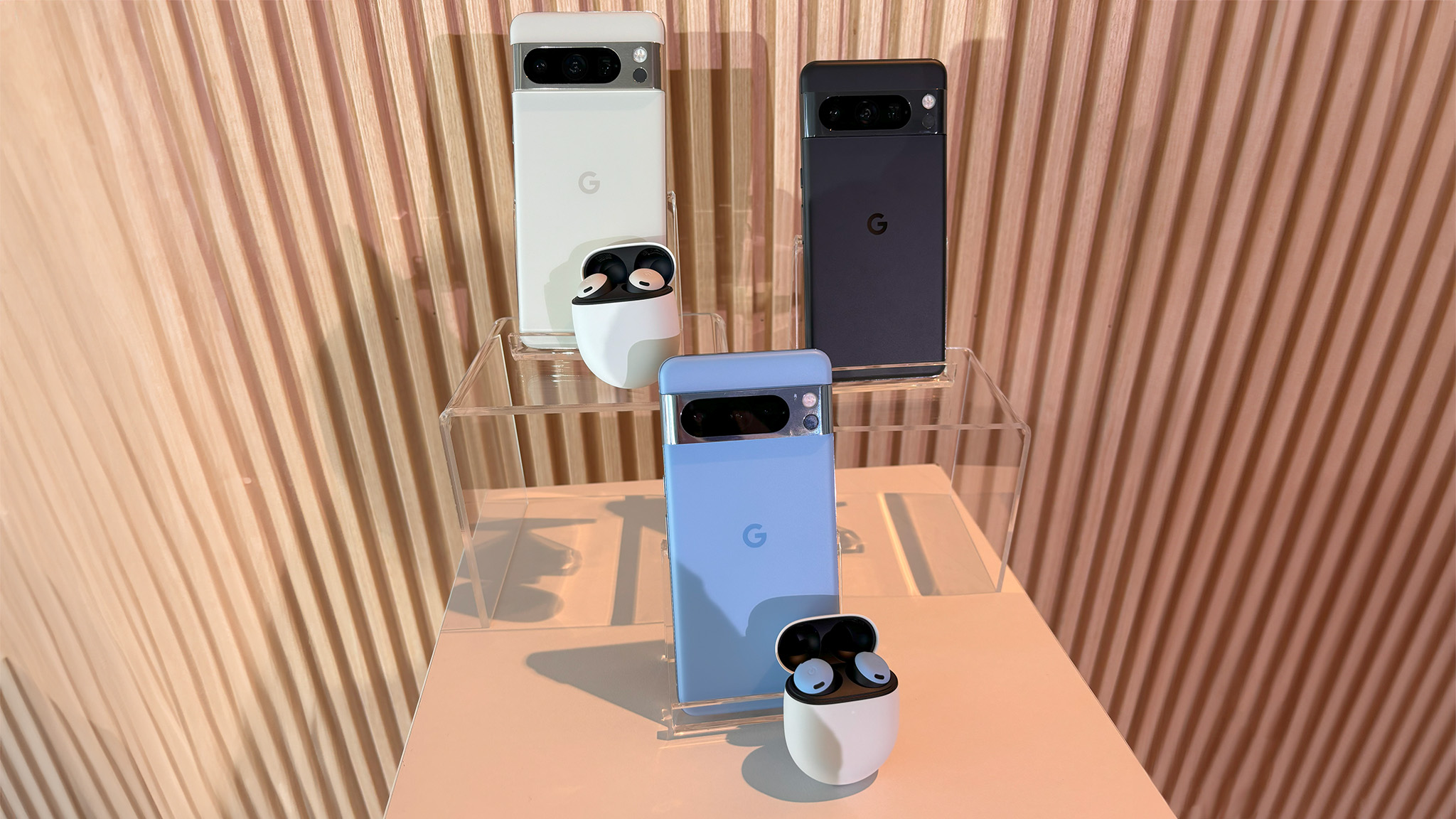
No matter how you look at it, the Google Pixel 8 Pro is undoubtedly a better product than the Pixel 8. However, the price of both phones puts things in perspective. What used to be described as value flagships are now $100 more expensive to attain.
The Pixel 8 Pro starts at $999 for 128GB, and that price tag goes up to a whopping $1,179 for the 512GB model. Meanwhile, the Pixel 8 retails at $699 for the 128GB offering, going as high as $759 for the 256GB option.
Yes, this does take away from Google's reputation of making excellent premium phones and selling them at no-premium prices. However, the Pixel 8 and 8 Pro are still cheaper than top-of-the-line offerings from rivals like Samsung and Apple. The 128GB iPhone 15 sells for around $830, whereas the baby Galaxy S23 costs nearly $800 for the 128GB model. Since Google has increased its support lifespan to seven years with the Pixel 8 and 8 Pro, you'll still get phenomenal value for money.
The question then arises whether you should stick with the basic Google Pixel 8 or go all out on the Google Pixel 8 Pro. Honestly, this depends entirely on you and your budget. If you can afford it and want the ultimate Pixel experience, then the Pixel 8 Pro is going to serve you well. However, the Pixel 8 is nearly as great as its Pro counterpart and shares many of its best features. If you aren't a camera nerd but still want excellent pictures and videos, it's a very good choice.

The ultimate Pixel
The Pixel 8 Pro is Google's best phone yet, with unmatched AI-based software features, mind-blwoing photo and videography, and great overall internals.

The value flagship
Don't have the budget for a thousand dollar phone? Get the Google Pixel 8 instead. It may not have a fancy telephoto lens or a temperature sensor, but it's still and extremely capable Tensor G3-powered Android phone set to receive seven years of updates.

Namerah enjoys geeking out over accessories, gadgets, and all sorts of smart tech. She spends her time guzzling coffee, writing, casual gaming, and cuddling with her furry best friends. Find her on Twitter @NamerahS.
